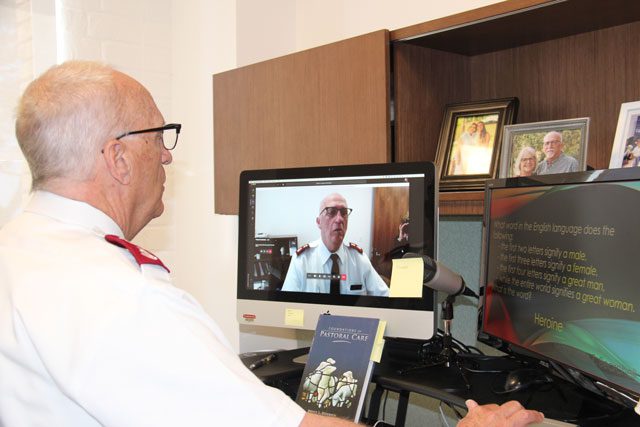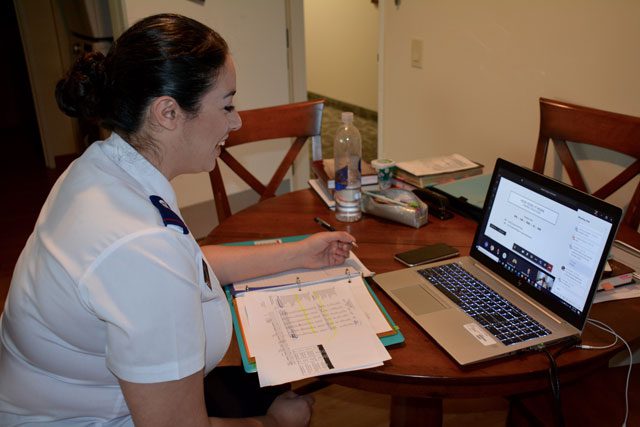Cadets and instructors transition to a virtual learning environment.
The College for Officer Training (CFOT) at Crestmont is weeks into the 2020 spring quarter, and for CFOT students and faculty, it is definitely not business as usual due to COVID-19. Yet, the Messengers of the Kingdom will be ready for Commissioning June 13–14, and the Messengers of Grace received summer assignments May 4. Their classroom experience, however, has changed completely, from in-person learning to online class meetings.
When the spring quarter began on April 13, California was well into the coronavirus shutdown, and students were observing shelter-in-place and social distancing mandates. All course instruction had to be online.
“This is not easy to implement under normal circumstances, but in the COVID-19-driven climate, God paved the way,” said Major Stacy Cross, CFOT Director of Education. CFOT Education Officer Captain Clinton Trimmer and CFOT Director of Business Administration and EDS Officer Captain Jared Arnold had already set up the Microsoft Teams platform for adjunct faculty who planned to teach remotely. Cross said that by the California Safer at Home order on March 19, the college had expanded its online learning capacities for all instructors.
“God again paved the way when the Accrediting Commission for Community and Junior Colleges lifted restrictions to allow institutions of higher education to move quickly to the online learning platform,” Cross said.
Instructors equipped with a camera and microphone teach remotely to cadets who are sheltering in their apartments. Despite challenges, it’s working.
“We have jumped over the hurdles of failing technology, inadequate bandwidth, frozen screens, and we are learning how to engage students online,” Cross said.
Second-year Cadet Ezequiel Hernandez commended the college for how it has handled the challenge. “The college has been very responsive in working out any technical problems that arise, and it continues to provide support to us as we move forward with our classes,” he said.
Trimmer was pleased with the transition.
“Microsoft Teams allows us to have many of the teaching moments we are used to, although it looks a bit different online,” he said. “The new software was a hurdle for some of our faculty, but once the realization that teaching really could still happen took root, faculty members learned the system quickly. It was good to see how the transition to Teams has been indeed a collaborative effort among faculty and cadets.”
However, the online experience does take some getting used to.
“We are not in the normal zone anymore,” said Sarah Bentley, Director of Officer Resources and Leadership Development and CFOT instructor, who currently teaches the Addictions and Recovery class with Major Shari Fowler; she also oversees the Foundations continuing education program for new Lieutenants. In-person in the classroom, she said, students and instructors benefit from being in community, and adult learning theory suggests that such interaction benefits students as they learn.

“Now we live in a world of ‘please turn your camera off and mute your mic unless you are asked a question or have something to say’…not an ideal learning environment,” Bentley said. “Yet, after a week of classes, I’d say it’s going really well. The cadets have been amazing, online and on time. Technology has been our friend. We are all learning on this journey and making the most of the experience.”
Major Brian Bearchell, CFOT Continuing Education Officer, said since he has never taken or taught an online class, he found the switch from classroom to the camera “rather difficult,” while noting that people’s experience with social media helped the transition. “The toughest part for me is the limited class participation,” he said. “There is a lot of momentum lost while waiting for the student to unmute their mic to share a comment or question.”
While the cadets miss being together in person, they are grateful technology allows them to continue their studies.
Second-year Cadet Betty Vesikula said the move to an online learning platform was personally challenging.
“I am not so tech savvy,” she said. “Logging into our classes via Teams made me realize how much I miss the open, honest and heartfelt discussions we used to have in a classroom setting…However, our leaders and instructors are fully aware of how we feel and have been so gracious and supportive. We’ve had a few ‘hallelujah breakdowns,’ but that hasn’t stopped us from our desire to learn and grow, so we plan on moving forward together and will make the best of the two months we have left.”
First-year Cadet Andrielli Santos said the Microsoft Teams platform is “very good,” and—even more noteworthy—“the teachers are also available for almost 24 hours to help us.”
This transition to online learning can be especially challenging for students, like Santos, who speak English as their second language (ESL). In a classroom setting, these students can get immediate help from classmates.
However, Santos said, “I have seen that the teachers committed to making it possible for all students to understand. All classes have been recorded and are available so that after class they can get back to you with support to answer any questions.”
She summed up the virtual experience: “Overall, although different, it has been a great experience where I get to see the ability of the Army to respond and adapt to a constantly changing environment.”
HOW TO HELP:
- If you’d like to make a monetary donation, please click here to make a gift.
- Text ‘GIVE’ to 52000 to make a $10 donation to The Salvation Army. This will automatically add a one-time donation to your next mobile phone bill.
- For information about volunteering, please visit volunteer.usawest.org.
- To learn more about how to support The Salvation Army’s relief efforts, please click here.











